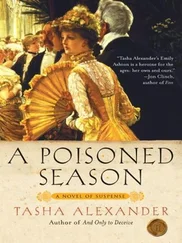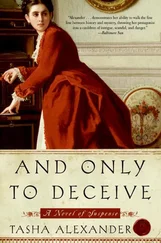“What treatments did you prescribe for Mademoiselle Prier?” I asked.
“I agree with the principles of Philippe Pinel, who established the idea of moral treatment. No beatings, no shackles. Patients should be treated with respect. There are some medicines that can help restore a person’s vital force, but I found they did little for Edith. I set her to work—having time strictly organized can help a troubled mind. She made clothing for dolls that we sent to church charities. I talked to her, tried to ease her pain. But she slipped further and further away from reality.”
“Was she still able to work as her condition worsened?” I asked.
“Yes. Oddly enough, although she would forget where she was, forget those around her, her sewing grew more and more proficient. You could tell, however, that her mind was fixed in unusual ways. Every outfit she made included a blue satin ribbon. She was obsessed with them.”
Swallowing hard, I pictured the ribbon in the road in front of Colin’s mother’s house, pictured it tied in the hair of the girl who stood in the window of the Markhams’ dovecote, and wondered what, precisely, I’d seen. Trying to remain calm, I drew a deep breath. “Where do you think she went when she escaped?”
“The only member of her family who visited her was her brother. Initially, he was happy she was here, but eventually, he started pleading with me to release her. In the end, I think he came to realize that she could not live in an ordinary way. Her father asked for regular updates on her condition, but even when he came to speak to me in person refused to see her. Her mother never came at all, only sent letters at infrequent intervals.”
“Did anyone else visit her?” I asked.
“One gentleman,” the doctor said. “A family friend. Or so I thought. After she’d gone, I tried to get in touch with him and found it impossible to track him down. So far as I can tell the identity he’d presented to me—that of a Monsieur Myriel—was false.”
“Do you know anything about him?”
“Only that he was extraordinarily kind to Edith, and that she enjoyed seeing him. I do hope someone’s told him of her death. I was as thorough as possible in attempting to find him—I’m afraid he’s disappeared.”
“It’s Vasseur, you know,” I said. Monsieur Leblanc and I had returned to Rouen, but instead of going to the Priers’, we’d settled into a café where we could discuss Edith’s lover away from her family. Dr. Girard, though charming and pleasant, had refused to give us any further information about Edith’s condition, and would not address the possibility that she thought she was seeing ghosts. “He had to be the one who was visiting her and calling himself Myriel. What do you know about him?”
“Very little despite extensive research,” he said. “He’s a career soldier, which wasn’t a glamorous enough occupation for Monsieur Prier.”
“He probably didn’t want his daughter to marry a man who required an occupation.”
“You aristocrats are an odd lot.”
“Are the Priers aristocratic?” I asked.
“Not on his side, but his wife’s family still retain their obsolete titles. Not the sort to want an undesirable son-in-law.”
“Is Vasseur an officer?”
“He is. Spent some time in Indochina.”
“And you’ve no idea where he is now?”
“I traced him to the Foreign Legion, and according to their records he was discharged eight months ago.”
“It had to be earlier than that or he couldn’t have been visiting her regularly,” I said.
“He could have had someone checking in on her on his behalf. And then, when he was able to return to France—”
“He came for her,” I said. “As soon as he could. So why, then, is she dead?”
When I reached the Priers’ house I went straight upstairs and pounded on Laurent’s door, which was locked. After being ignored (I could hear him inside, his footsteps heavy on the old plank floors) I crawled through the passage in my armoire.
“Don’t you find this somewhat ridiculous?” I asked, smoothing my skirts. “It would be so much easier to just let me in.”
“Edith always liked making a game of it,” he said.
“I’m not Edith.”
“And I didn’t invite you to speak to me.”
“Monsieur Vasseur left the Foreign Legion not long before your sister disappeared from the asylum.”
“Is he back in France?” Laurent’s face reddened and he clenched his fists.
“I have no idea,” I said. “Perhaps now would be a good time to tell me what you know about him.”
“He killed her because he couldn’t have her.”
“A romantic idea, to be sure,” I said, incredulous. “But has it any basis in fact?”
“My sister had a heart and soul unlike anyone’s. She felt things more deeply than ordinary people do. Vasseur fed her pretty lines and poetry and seduced her with hardly any effort.”
“Did she love him?”
“Desperately.”
“Why do you despise him? Perhaps he loved her.”
“There are things a gentleman doesn’t do to a lady he loves.”
“Such as?”
“I’m not discussing it.”
“You frustrate me, Laurent,” I said. “The police believe your sister was killed by a man who murdered prostitutes in London. If you have reason to believe someone else is guilty, you’re obligated to come forward with whatever evidence you have.”
“Do you like playing detective?”
“I do, in fact, and I’m good at it.”
He laughed. “I suppose you always identify the killer before the end of Sherlock Holmes novels.”
“Yes, but that’s hardly the point. I caught the man who murdered my first husband; I cleared erroneous charges against a dear friend, and have solved two other crimes. I’m certainly more qualified than you to figure out what happened to your sister—although I can’t vouch for you being capable of anything beyond brooding and playing Beethoven.”
“I don’t like you.”
“I don’t care. All that matters now is where your sister spent the last six months of her life.”
He turned away from me and stomped across the room to a window, which he flung open. “Can you doubt he killed her?”
“Vasseur?” I asked. “I know nothing about him except that it appears he was romantically involved with Edith. The fact that you were jealous of their relationship is hardly cause to suspect him of murder. It’s more likely to make me wonder about you.”
“You accuse me?” He whirled around.
“No. But you give me nothing—not even the slimmest reason to doubt this man’s feelings for your sister.”
“He got her with child,” he said, stepping towards me, his eyes full of menace. “And then left her to deal with the consequences on her own.”
“But he wanted to marry her?”
“My father had forbidden his suit, but he continued to pursue her. Because they couldn’t meet openly, he arranged clandestine meetings. And once he was able to be alone with her, away from all decent company, without any limits, he took advantage of her.”
“She must have been devastated,” I said.
“She wasn’t.” He sank onto his piano bench and dropped his head into his hands. “She was ecstatic. She wanted to marry him. Thought they would elope.”
“Was he unwilling?”
“I wasn’t about to leave her in the hands of a man who would behave so dishonorably.”
“And the baby?”
“She lost it,” he said. “Which was the best thing that could happen in such a situation.”
“Did your parents know?”
“Of course not. Only Dr. Girard, who cared for her.”
“So she’d already been sent away?”
“I was able to persuade her that she needed rest.”
Читать дальше












